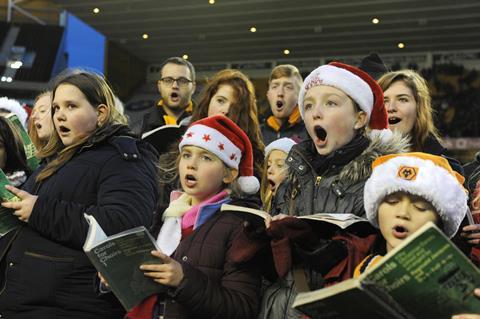Andrew Gant unpacks the mysterious origins and strange evolutions of some of our favourite – and less well-known – festive words and tunes

When you stop to think about it, some of the words and imagery in our favourite Christmas carols can be pretty odd.
Never mind the ground-dwelling partridge climbing a pear tree, or three ships with two passengers sailing into Bethlehem, which is landlocked. Where does the idea of ‘Tomorrow shall be my dancing day’ come from? What is a dancing day? Why tomorrow?
This ancient and mysterious lyric actually charts a fascinating journey through the entire Christian worldview from creation to last things. When we sing it as a Christmas carol, we tend to just snip out the verses about the nativity. This is very much not how folk carols work at all: they are much richer, more mysterious and more complex than that.
Divine inspiration
Much later, the Irish hymn writer, Cecil Francis Alexander, adopted a similar approach in assembling her book of poetry, Hymns for Little Children, in 1848. Alexander structured her book by taking a line from the Creed and the Lord’s Prayer as the starting point for her own poetic meditations. In the section devoted to the Creed, we find ‘All things bright and beautiful’ under the verse about the creation; ‘There is a green hill far away’ as her meditation on the crucifixion and, of course, ‘Once in royal David’s city’ for the nativity. Alexander published her poems without tunes; the music was added soon afterwards by organist Henry Gauntlet.
Wesley actually wrote “Hark how all the welkin rings”, but editors didn’t think people would know what a ‘welkin’ was
In many cases, however, music and words came from entirely different places. It came upon a midnight clear is a poem by an American priest, Edmund Sears. He asked a friend of his to set it to music. This tune is the one you will still hear song by American choirs and congregations today. Not in England, however. How did that happen? Well, the words made it into English hymn and carol books without the tune. Then composer, Arthur Sullivan, paired the poem with a tune derived from an English folk song.
Nor is this the only carol which is sung to different tunes on either side of the Atlantic: the same is the case for ‘O little town of Bethlehem’ and ‘Away in a manger’. Not all English Christmas carols are as English as they may seem!
The heavens cry out
And what about ‘Hark the herald angels sing’? That’s a nice easy one, surely? The music is by Mendelssohn and the words are by Charles Wesley - aren’t they? Well, up to a point. In fact, Mendelssohn wrote the music as part of a cantata to mark the anniversary of the birth of the printer, Johannes Guttenberg, and told his English publisher (very firmly) never to use it as a hymn. The publisher did anyway.
Folk carols are much richer, more mysterious and more complex
And we sing exactly one word of Wesley’s poem, Hark, before we get onto the additions of later editors. Wesley actually wrote “Hark how all the welkin rings”, but later editors didn’t think people would know what a ‘welkin’ was. Readers of Premier, of course, know perfectly well that “welkin” is a splendidly archaic word for the sky; the firmament; the heavens. The right word, in fact.
So enjoy singing once again this wonderful, rich, mysterious (and sometimes rather odd) repertoire of songs which we know as our English Christmas carols.
Happy Christmas.
Andrew’s book Deck The Hall: The stories of our favourite Christmas carols (Hodder Faith) is available now



































No comments yet